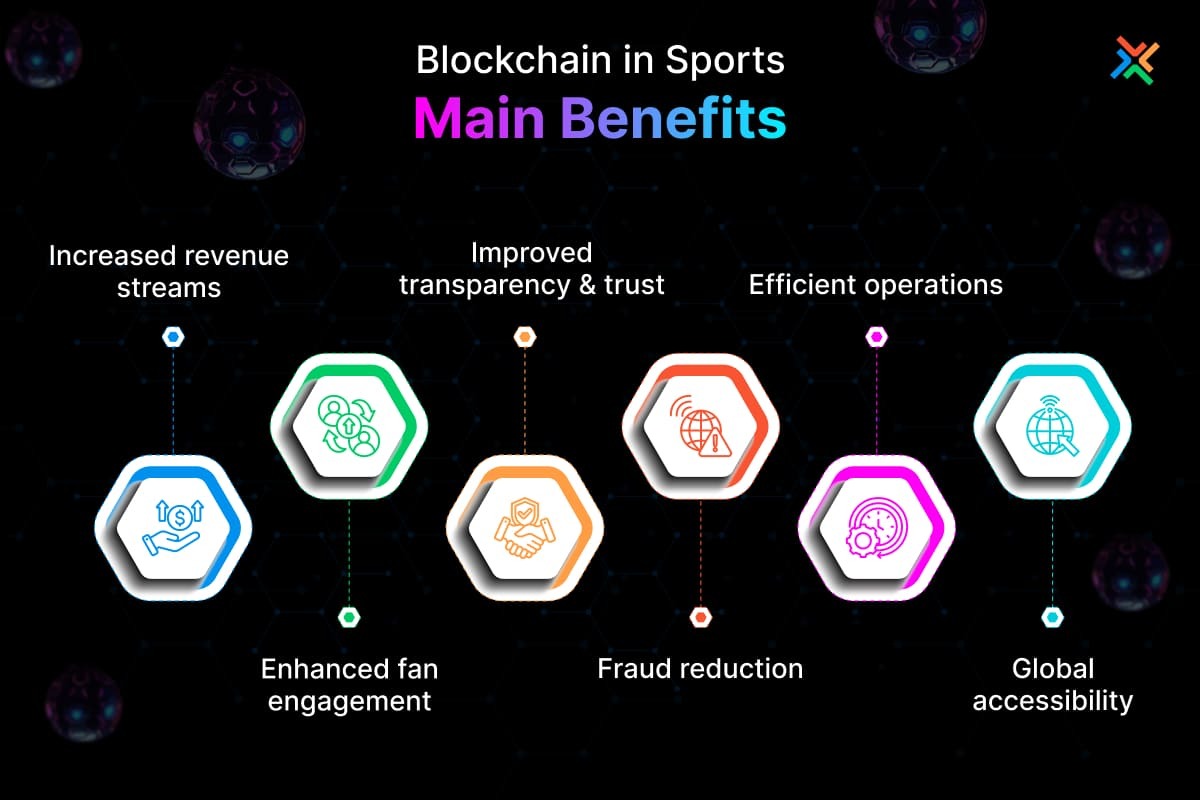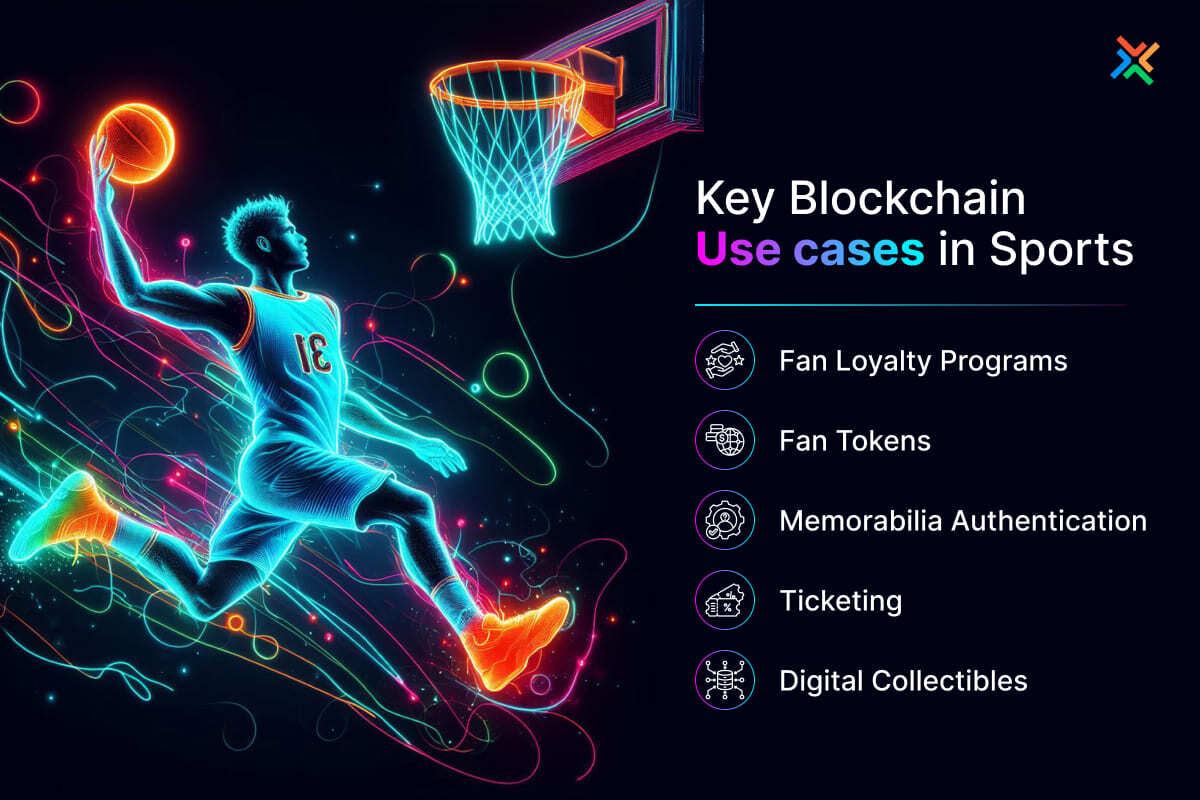Blockchain in Sports: A Game Changer? Examining Use Cases, Advantages, and Drawbacks
March 22, 2024

Ayush Kanodia

The passionate roar of the crowd, the thrill of victory, the agony of defeat – these are the hallmarks of the global sports industry, a multi-billion-dollar behemoth that continues to captivate fans worldwide. However, beneath the surface of this seemingly idyllic world lies a growing sense of unease among fans. Ticketing issues like scalping and fraudulent practices cast a shadow on the experience, while limited avenues for engagement can leave fans feeling disconnected from their favorite teams and athletes. Furthermore, concerns regarding data privacy and the control over athlete performance metrics add another layer of complexity.
This begs the question: is the current sports industry model sustainable in the face of evolving fan expectations and technological advancements? Well, it can be; with the help of blockchain in sports development. Blockchain technology is a revolutionary force already disrupting numerous industries with its core principles of decentralization, security, and immutability. It is like a digital ledger, a secure and transparent record-keeping system that eliminates the need for intermediaries. This is the essence of blockchain, and its potential application in sports offers a glimpse into a future that is more secure, engaging, and empowering for fans, athletes, and organizations alike.

The Pitfalls of the Present System
The current sports industry operates under a system riddled with inefficiencies that ultimately hinder the overall experience for fans and athletes. It is essential to dive deeper into some of these critical issues.
Ticketing
Scalping remains a persistent problem, with automated bots snatching up large quantities of tickets and reselling them at exorbitant prices. A recent example further highlights the issue of scalping. In 2022, tickets for the much-anticipated India vs. Pakistan Asia Cup cricket match in Dubai were scalped online for as much as ten times the original price. This left many fans disappointed and frustrated, underscoring the need for a more secure and transparent ticketing system. Fans face the constant struggle of securing tickets at a fair price, while teams lose revenue and control over distribution. Counterfeiting also plagues the ticketing system, leading to frustration and potential safety concerns for fans attending events. The secondary market, while offering some flexibility, often lacks transparency and security, leaving fans vulnerable to scams.
Fan Engagement
Traditional loyalty programs often fall short of providing a deep connection between fans and their favorite teams or athletes. Consider a scenario where a die-hard fan attends all their favorite team's home games, faithfully purchases merchandise, and even travels to see away games. Yet, under the current system, their level of engagement might not translate into any meaningful interaction or influence with the team. Blockchain technology, with its potential for creating fan tokens, could provide a platform for more rewarding fan engagement. These tokens could grant exclusive access to behind-the-scenes content, voting rights on certain team decisions, or even discounts on merchandise – creating a more personalized and interactive fan experience.
Data Management
Athlete performance data is a valuable asset, but concerns linger regarding ownership and transparency. Disputes arise when teams and players clash over who controls this data, for instance, detailed statistics on a baseball player's swing mechanics or a soccer player's sprinting speed. This data can be incredibly insightful for training purposes, scouting potential talent, and even attracting lucrative sponsorship deals. However, without clear ownership rights, athletes may feel they are not adequately compensated for the data they generate through their performance. Furthermore, the potential for manipulation and a lack of robust security measures raise concerns about the integrity of the data itself.
Athlete Empowerment
Athletes often have limited control over their image rights. Consider a star football player whose electrifying dribbles and signature moves are a major reason fans flock to games and buy jerseys. Under the current system, the revenue generated from merchandise sales featuring his image may not be directly shared with him. Blockchain technology has the potential to create a more equitable system where athletes can benefit more directly from their image rights. Imagine a scenario where fans can purchase digital collectibles featuring a player's signature dunk, with a portion of the proceeds going directly to the athlete.
Blockchain in Sports as a Solution
The innovative nature of blockchain development services in UAE offers solutions to the challenges plaguing the current sports industry. Here's how blockchain can revolutionize the fan experience, vouch for athletes, and open up new opportunities for sports organizations.

Fan Engagement Revolution
Another application of blockchain in sports development is Fan Tokens. It holds immense potential for revolutionizing fan engagement. These tokens, purchased by fans, can offer a variety of exclusive benefits. For instance, you can use your fan token to vote on a new team jersey design, gain access to behind-the-scenes training footage, or even purchase limited-edition merchandise. Additionally, blockchain can facilitate gamified experiences where fans earn tokens for participating in polls, contests, or social media activities. This creates a stronger sense of community and incentivizes deeper fan engagement.
Data Transparency and Security
Blockchain can create a secure and tamper-proof record of player data, accessible only to authorized entities like athletes, teams, and medical professionals. This leads to data integrity and eliminates concerns about manipulation. Fantasy sports platforms can tap into this secure data to offer more accurate and reliable player performance metrics. Scouting becomes more efficient with a transparent and verifiable record of player statistics across various leagues and age groups. Furthermore, blockchain opens the door for athlete-controlled data platforms, which allow athletes to own their data and choose to share it with specific teams or training facilities in exchange for a fee.
Decentralized Ticketing
Experienced blockchain developers UAE can create a secure and verifiable ticketing system, eliminating the issues of scalping and counterfeiting. It can facilitate a system where tickets are issued as digital tokens on a blockchain network. This ensures transparency and immutability – once a ticket is issued, it cannot be replicated or forged. Furthermore, smart contracts, self-executing programs on the blockchain, can automate ticket resales. These smart contracts can be programmed to prevent scalping by setting fair resale price limits and ensuring a portion of the proceeds go back to the team or artist.

These solutions not only enhance transparency and security but also create new revenue streams.
New Revenue Streams
Sports organizations can generate new revenue through fan token sales, offering exclusive experiences and voting rights. Digital collectibles, such as player highlight reels or iconic moments tokenized on the blockchain, can be another source of income. Additionally, a more efficient ticketing system eliminates the middleman, allowing teams to capture a larger share of ticket sales revenue.
Empowering Athletes
Blockchain aids athletes by granting them more control over their data and image rights. Athletes can choose to share their data selectively with teams or sponsors while retaining ownership. The technology can facilitate a platform where athletes can create and sell digital collectibles featuring their signature moves, with a portion of the proceeds going directly to them. This offers new opportunities with regard to athlete monetization, such as crowdfunded training programs or directly connecting with fans for personalized monetization.
Blockchain's Untapped Potential
While the solutions discussed so far paint a promising picture, blockchain's potential in the sports industry is not limited to established applications. As the technology matures, we can expect exciting new use cases to emerge.
Secure and Transparent Athlete Contracts
Blockchain can revolutionize athlete contracts by creating a secure and tamper-proof record of agreements. This would eliminate disputes over contract terms and ensure both athletes and teams operate under a clear and transparent framework. For instance, smart contracts can automatically trigger bonus payments upon achieving specific performance milestones, optimizing the process for both parties.
Decentralized Streaming Platforms with Direct Fan-Athlete Monetization
The current sports streaming space is dominated by large corporations. Blockchain has the potential to disrupt this model by facilitating decentralized streaming platforms. These platforms would allow fans to directly support athletes through microtransactions or tokenized subscriptions, creating a more equitable revenue-sharing model. Fans can subscribe directly to their favorite athletes' channels to access exclusive content or live streams, empowering both athletes and fans.
Tokenized Digital Collectibles with Unique Ownership and Value
Digital collectibles are already gaining traction in the sports world. A custom blockchain solutions company UAE can take this a step further by creating truly unique and verifiable digital collectibles. Each collectible, whether a game-winning play video or a player's signed digital jersey, would be a one-of-a-kind token on the blockchain. This ensures authenticity and leads to a thriving marketplace for trading these collectibles, with potential value appreciation over time.
Drawbacks and Considerations
Blockchain presents a compelling vision for the future of sports. However, it’s crucial to address some key considerations before widespread adoption.
Scalability and Adoption
Current blockchain technology faces limitations in terms of scalability. Processing large volumes of transactions can be slow and expensive. Mainstream adoption within a vast industry like sports requires robust and scalable blockchain infrastructure. This is an ongoing area of development, with researchers exploring various solutions like layer-2 scaling protocols.
Legal and Regulatory Framework
The legal and regulatory framework surrounding blockchain technology is still evolving. The legal and regulatory landscape surrounding blockchain technology is still evolving. Uncertainties regarding regulations might affect how sports organizations approach blockchain integration. Clear regulatory frameworks are essential for enhancing trust and promoting wider adoption within the sports industry.
Technological Integration
Integrating blockchain technology with existing legacy systems within sports organizations can be a challenge. These organizations often rely on complex infrastructure, and integrating new technology requires careful planning and investment.
Environmental Impact
The energy consumption of certain blockchain networks, particularly those that rely on proof-of-work consensus mechanisms, has raised environmental concerns. However, it's important to note that alternative, more sustainable protocols are being actively explored and developed. The sports industry itself is increasingly environmentally conscious, and the development of energy-efficient blockchain solutions, such as proof-of-stake protocols, will be crucial for long-term adoption.
Blockchain in Sports as a Game Changer in the Making
The potential of blockchain app development services in UAE to transform the sports industry is undeniable. It promises a future where fans have a deeper connection with their favorite teams and athletes, assisted by secure and transparent systems. Athletes have more control over their data and image rights, and organizations explore innovative revenue streams. Blockchain technology has the potential to create an ecosystem of trust, transparency, and engagement in the world of sports.
As the technology matures and the challenges are addressed, blockchain is set to become a game-changer for the sports industry. This is not just about tickets or digital collectibles; it's about creating a more secure, transparent, and ultimately, more rewarding experience for everyone involved. The future of sports is bright, and blockchain technology is at the foundation of this exciting evolution.
Be a frontrunner in blockchain-based sports solutions with WDCS.
The sports industry is at the cusp of transformation with the advent of blockchain technology. Partner with WDCS to build a progressive blockchain-based sports solution.